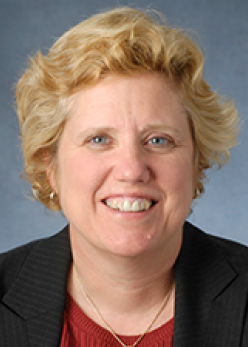Big Data for Drug Discovery
This Research Rising project will integrate cutting-edge biotechnologies that collect large amounts of data in order to create a more holistic understanding of human diseases and empower the discovery of new drugs to treat them. The principal investigator is Michael Wolfe, Mathias P. Mertes Professor of Medicinal Chemistry. He is joined by faculty colleagues in molecular biosciences, pharmacy, chemistry, electrical engineering & computer science and several departments at KU Medical Center.
Project Goals
Making KU competitive in using big data for drug discovery will require adding faculty with proven expertise and experience in this broad area. We plan to search for four new faculty members whose research involves the use of large datasets for drug discovery, in different but interrelated areas. Specifically, we seek to identify and hire such an investigator for each of four areas: (1) pharmacology, (2) molecular cell biology, (3) chemical biology, and (4) medicinal chemistry. Bringing in investigators into these four areas as it relates to use of big data is expected to lead to synergy as well as providing a hub of expertise for broader collaborations at KU and KUMC.
The Center for Systems Pharmacology & Translational Science (CSPTS) will fund small pilot project grants to support KU investigators with innovative ideas for using big data for drug discovery. This seed funding is to encourage research faculty to think creatively about how their current research can be accelerated, enhanced or expanded by systems-based approaches. Funding will support 5 one-year pilot projects at $50,000 each (one pilot project per year for five years).
Critical to identifying small molecules as tool compounds and therapeutic prototypes is the ability to conduct high-throughput phenotypic screening. This is critical for identifying compounds that perturb a biological process for which the target(s) is not known. Moreover, such screening is critical when the goal is to perturb whole networks, not just a single enzyme or pathway. Although KU's High Throughput Screening Laboratory can conduct some cell-based screening, it is not equipped to conduct phenotypic screening in a high throughput format. Phenotypic HTS approaches are based on utilization of whole cells in two- or three-dimensional growth formats that have potential to faithfully recapitulate human biology.
To fill this gap, the project will purchase a Cytation 10 confocal imaging reader that uses custom confocal and wide-field microscopy in one system. The instrument will be purchased in the first year of the project and set up in the High Throughput Screening Lab, making the facility fully capable of conducting phenotypic high throughput screening with center investigators, pilot project recipients and other campus users.
The Center for Systems Pharmacology & Translational Science will fund, organize and host on campus an annual half-day symposium on systems-based approaches to drug discovery. The symposium will be open to students, staff and faculty in the region and state. An outside speaker will be invited to give a keynote lecture as part of the symposium.
The center will also conduct an annual workshop on systems-based approaches to biology, disease and translational science. In addition, the center will provide travel awards to graduate students and postdoctoral fellows to attend and/or present at scientific conferences related to center-sponsored project.
Goal Progress
Four new hires have been made: Luke Erber, Iredia Iyamu, Hans Dalton, and Jesse Wiley.
The original Research Rising proposal aimed to support one pilot project a year at $50K. A call for proposals was announced in October 2022, 2023, and 2024. Review and evaluation in each round resulted in the awarding of pilot project grants in 2023, 2024 and 2025. The first year of funding included a $25K contribution from the KU Cancer Center for a cancer-related project.
2023 Projects:
Project title: Sialic acid meditated immune evasion mechanism. PI: Mark Farrell, KU Medicinal Chemistry, This project aimed to use chemical probes and full protein analysis to understand how a type of sugar modification on the cell surface can help cancer cells evade detection by the immune system. This unbiased data-driven approach castes a broad to enable formulation of mechanistic hypotheses that can be investigated.
Project title: Deconvolution of single-cell multi-omics layers in triple negative breast cancer. PI: Nanda Yellapu, KUMC Biostatistics & Data Science. This project analyzed existing single-cell vs. bulk RNAseq datasets from triple negative breast cancer biopsies, with the goal of elucidating a means of predicting single-cell gene-expression data using the much cheaper and faster method of analyzing gene expression of all cells in the sample together as one. Such capability would greatly facilitate precision medicine chemotherapy for this aggressive and difficult to treat form of breast cancer.
2024 Project
Project title: Translating multi-omics data into novel glaucoma treatments. PI: Michael Wang, KU Pharmaceutical Chemistry. This project aims to understand the molecular changes leading to glaucoma to develop new treatments. To complement findings from analyzing gene expression changes in glaucoma, the Wang Lab will analyze for all changes in protein levels. These experiments will validate certain protein targets that can be leveraged for development of new therapeutics.
2025 Project
Project title: Sonomolide probes for antifungal target ID using whole-cell chemical proteomics. PI: Shyam Sathyamoorthi, KU Medicinal Chemistry. This project aims to develop the first synthesis of antifungal natural products sonomolides, use this method to synthesize analogs that enable chemical probe development to identify the protein target of these structurally distinct bioactive compounds. New targets are desperately needed to combat difficult to treat systemic fungal infections.
As originally proposed, the research rising team purchased a Cytation 10 confocal imaging reader from Agilent Inc. for the KU High Throughput Screening (HTS) Laboratory. The Cytation 10 captures high-resolution images from various planes of a three-dimensional biological system; the system is thus conducive to phenotypic HTS. The proprietary software allows rapid analysis of images captured from 384- and 1536-well microplates that are used routinely for drug discovery screening campaigns. Since its installation in October of 2022, users have included investigators at KU, KUMC, Children’s Mercy Hospital, and K-State.
Research Team

Hans M. Dalton

Luke Erber

P. Scott Hefty

Iredia D. Iyamu

Devin C. Koestler

Susan M. Lunte

Nancy A. Muma

Scott Weir

Jesse Wiley

Michael S. Wolfe